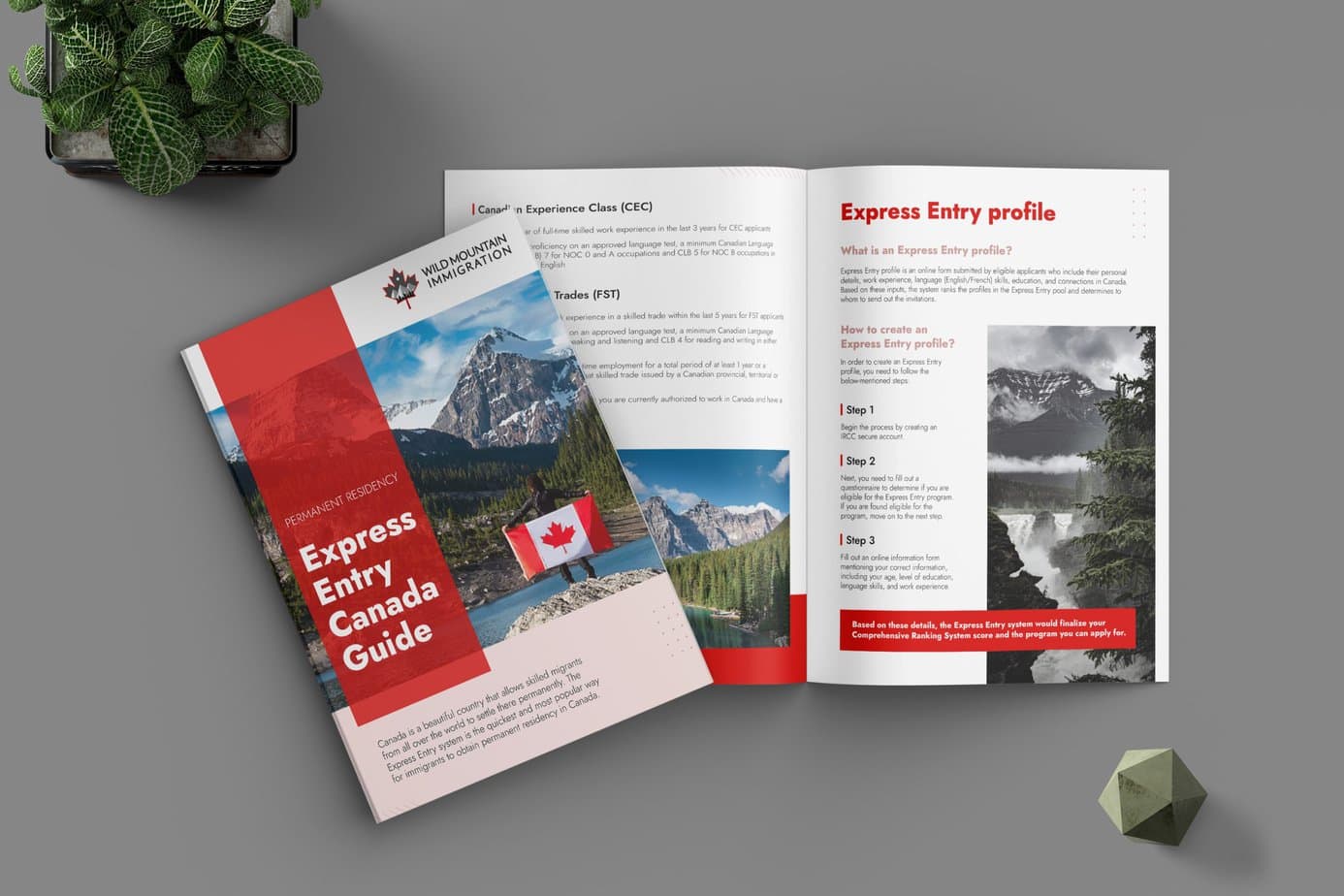Canada is a country that offers breathtaking natural beauty, from its picturesque coastlines and glaciers to its mountains, forests, and diverse wildlife. Beyond its stunning landscapes, Canada is also highly regarded for its high standard of living, excellent healthcare, top-notch educational institutions, strong employment market, and safe environment.
Immigrants can move to Canada through various immigration programs, including work permits, permanent residency, and study permits. To move, one must assess their eligibility, gather necessary documents, understand the application process, and submit a successful application.
This guide provides a comprehensive overview of the options on how to move to Canada to help you make an informed decision and start your new life.

Canadian Immigration Consultant
At Wild Mountain Immigration, we understand the journey ahead for immigrants who aspire to call Canada home. As a Canadian immigration consulting firm founded by English founders, now proud Canadian citizens, we bring a unique and personal touch to our services.
Our team of seasoned immigration experts is dedicated to guiding you through the complex immigration process, ensuring that your application is tailored to your specific needs and circumstances, and submitted with confidence.
How to move to Canada
Canada is among the top countries in the world when it comes to allowing immigrants to settle within its territory. This attitude of Canadian citizens is mainly based on the fact that these immigrants contribute greatly to the country’s economy by filling in shortages of skilled workers and creating many jobs.
Therefore, Canada offers close to 100 different programs to make the immigration process simpler for people interested in moving into the country. As long as you fulfil all the necessary requirements, you can apply for temporary or permanent residency in Canada.
Below are some of the most popular routes for people wanting to learn how to move to Canada.
Table of contents
Work in Canada
International Experience Canada (IEC)
International Experience Canada (IEC) is a unique initiative that facilitates the exchange of young individuals between Canada and over 30 countries that have established a youth mobility agreement. This program is specifically tailored to offer young adults the chance to immerse themselves in a different culture, gain international work experience, and explore the vast landscapes of Canada through travel and employment opportunities.
The IEC program is segmented into three primary categories, each designed to suit different interests and career stages: Working Holiday, Young Professionals, and International Co-op (Internship).
The Working Holiday category is perhaps the most flexible, appealing to those who wish to travel in Canada while working temporarily to fund their adventures. This category is ideal for individuals who are not necessarily tied to one location or employer and are looking for a broad Canadian experience. It provides an open work permit, allowing participants to work for almost any Canadian employer.
The Young Professionals category is designed for those who seek to gain professional work experience in Canada that is related to their field of study or career path. This category requires participants to have a job offer in Canada before applying, and the work permit issued is employer-specific. It’s an excellent opportunity for career advancement and international networking within one’s profession.
The International Co-op category caters to students enrolled in post-secondary institutions who are required to complete a work placement or internship in Canada as part of their academic curriculum. This program facilitates the acquisition of valuable international work experience in one’s field of study. Like the Young Professionals category, the work permit is employer-specific, and participants must have a job offer from a Canadian employer related to their field of study.
Labour Market Impact Assessment
To apply for a closed work permit, a foreign national needs a valid job offer from a Canadian employer. Additionally, the employer is required to secure a Labour Market Impact Assessment (LMIA) from Employment and Social Development Canada (ESDC) prior to the foreign national’s work permit application.
An LMIA is a crucial document that Canadian employers need to acquire when hiring foreign workers for jobs not exempt from this requirement. It evaluates the potential impact of hiring a foreign worker on the Canadian job market and is issued by an authorized entity.
For an LMIA, employers must apply to Employment and Social Development Canada (ESDC), paying the necessary fee. Upon approval, ESDC issues a confirmation letter, which the employer then uses to facilitate the foreign worker’s work permit application.
Intra Company Transferee
Canada’s Intra-Company Transfer program is part of the International Mobility Program, which allows high-skilled foreign nationals from multinational companies to work in Canada without needing a Labour Market Impact Assessment (LMIA).
Eligibility criteria for employees include working in executive, senior managerial, or specialized knowledge capacities, and having been employed for at least one year in the past three years. The Canadian and foreign enterprises must have a qualifying relationship such as a parent, subsidiary, branch, or affiliate, and be actively engaged in business. Eligible individuals can apply for an LMIA-exempt work permit under certain conditions.
Real Stories
Hear from real immigrants who have made the move to Canada.
Canadian permanent residency
Several Canadian immigration programs are available for those looking to move to Canada. Below are descriptions of some of the most popular options:
Express Entry Program
Express Entry is a streamlined immigration system used by the Canadian government to manage applications for permanent residency from skilled workers. It consists of three distinct streams, each catering to a specific group.
The Federal Skilled Worker Program (FSWP) is designed for skilled workers who have at least one year of work experience in a qualified occupation and possess a certain level of education and language proficiency.
The Federal Skilled Trades Program (FSTP) is for skilled tradespeople who have at least two years of work experience in a specific trade and meet the required language proficiency standards.
Additionally, the Canadian Experience Class (CEC) stream is intended for skilled workers who have accumulated at least 12 months of skilled work experience in Canada and possess the necessary language proficiency.
Candidates can create an online profile that will be ranked based on various factors, such as education, work experience, and language proficiency. If a candidate’s profile is selected from the Express Entry pool, they will be invited to apply for permanent residency in Canada.

Express Entry Ebook
This comprehensive guide will tell you everything you need to know.
Provincial Nominee Program
The Provincial Nominee Program is designed for people interested in moving into a certain province within Canada. Most Canadian territories and provinces run their own streams targeting specific groups of people who can contribute to that region.
To be considered for nomination under this program, you must fulfil all the essential criteria specified by the concerned province. While the application can be submitted in both online and offline modes, the procedure for the same varies.
Take a look at the Alberta Advantage Immigration Program or the British Columbia Provincial Nominee Program.
Spousal Sponsorship Program
The Canadian Spousal Sponsorship program enables citizens or permanent residents of Canada to bring their spouse, common-law partner, or conjugal partner to Canada as permanent residents. The sponsored person must pass security and medical checks, and the sponsor must prove that they have the financial means to support their partner and any dependents. This support must be maintained for a specific time frame, regardless of any changes in the future.
To be eligible for the program, the relationship between the sponsor and sponsored person must be genuine. Furthermore, the sponsored individual must not have any inadmissibilities such as security or criminal convictions, or be the subject of a removal order from Canada.
Atlantic Immigration Program
If you are a graduate of a recognized post-secondary Atlantic institution or hold expertise as a skilled foreign worker, you are eligible to apply for permanent residence in Canada under the Atlantic Immigration Program. But, you can only apply for this pathway if you are willing to reside and work in the Atlantic provinces of Canada, which include New Brunswick, Nova Scotia, Prince Edward Island and Newfoundland and Labrador.
This immigration pathway is designed to uplift the economy of the region by enabling employers to find skilled individuals for positions that the local residents cannot fill. You need to fulfil certain criteria related to language proficiency, education, and work experience to be chosen under this category.
Quebec Selected Skilled Workers Program
The province of Quebec has a special agreement with the Canadian government, which allows it to set its own rules for selecting skilled immigrants and granting them the status of permanent residents. You can apply for this immigration pathway if you are a skilled worker willing to settle and work in Quebec.
The program has a two-step application process. Firstly you need to submit an application to the provincial government to be considered for a Quebec Selection Certificate. The province of Quebec will assess your application, and the certificate will be issued if you are found to be eligible. After you get the certificate, you can move on to the next step, which involves applying to Immigration, Refugees and Citizenship Canada (IRCC) for permanent residence.

Learn how to move to Canada
Start your Canadian adventure with Wild Mountain Immigration, the trusted choice for those looking to move to Canada.
Business Immigration
If you are experienced in owning or managing a business, you can apply for permanent residency in Canada under the Business Immigration Program. The most popular categories under this program are mentioned below:
Start-Up Visa Investor Program
You can apply for permanent residence in Canada under the Start-Up Visa Investor Program if you are an entrepreneur willing to establish a new business in the country. The essential prerequisites for this program include having a novel business idea that can help create jobs in Canada and have the potential to compete with global businesses.
Moreover, you need to have a valid letter of support from a designated organization in Canada, fulfil language requirements, and own enough funds to support the expenses of yourself and your family.
Self-Employment Visa
If you hold expertise in athletics or cultural activities and are willing to contribute significantly in the above fields in Canada, you can apply for immigration under the Self-Employment Visa.
To be eligible for this program, you need to fulfil several requirements. These include having at least two years of experience in the relevant field, processing enough funds for settling into the country, and passing the required medical and security checks.
Study in Canada
If you are a British national who wants to move to Canada for higher studies, you need to apply for a study permit. To be eligible for this permit, you need to be enrolled at a Designated Learning Institution (DLI) in Canada and fulfil all the other requirements.
The study permit is usually valid till 90 days after the end of the study program you have applied for. This additional period is allotted to allow students to either extend their stay or move back to their native country.
How to move to Canada FAQs
Here are some frequently asked questions on how to move to Canada:
For immigrants seeking to move to Canada, the government prioritizes skilled workers through its economic immigration programs, but there are other options available. Visitors can stay in Canada for up to 6 months without a visa, and those with Canadian citizen family members may be eligible for a Super Visa allowing extended stays of up to 5 years.
If you’re interested in permanent residency, you may receive an invitation to apply through the Parent and Grandparent Sponsorship Program. Alternatively, moving to Canada before retirement, working and establishing residency, or starting or buying a business in Canada, are options for a permanent solution.
Your child may be able to accompany you when moving to Canada, based on factors such as age, relationship, and others. If immigrating as a permanent resident, dependents can also immigrate. If over 18, the child may immigrate independently. For specific eligibility and requirements, it’s advisable to consult a Canadian immigration consultant or lawyer.
Depending on your situation, it may be necessary to apply for a Canadian work visa, student visa or permanent residency.
The process of moving to Canada requires completing an immigration application. This may include medical exams, police clearance, and language proficiency tests. The specifics of the process depend on the chosen immigration program and personal circumstances.
The processing time can vary depending on the type of visa and the individual circumstances, but it can take several months or longer.
The amount of money you’ll need depends on many factors, such as the cost of living in the location you’re moving to, the cost of housing, and your personal expenses.
It is advisable to have health insurance coverage when moving to Canada, as the public health insurance system in Canada does not cover all medical expenses. It is important to research and compare the different health insurance options available to you, as the type and amount of coverage will depend on factors such as your age, medical history, and immigration status.
You may be eligible for coverage under the public health insurance plan of the province or territory in which you plan to reside; however, all provinces vary.
Canada has a publicly funded healthcare system that provides universal coverage to all citizens and permanent residents. If you reside in Canada, you are eligible for some healthcare benefits.
Coverage and services can vary by province or territory.
Conclusion
Moving to Canada involves a complex process with numerous factors to consider, including understanding how to navigate eligibility requirements and processing times. It’s crucial to research your options on how to move to Canada and consult with an immigration consultant or lawyer before making any decisions about immigration. With careful planning and preparation, you can ensure that you are ready for the journey ahead when it comes to relocating yourself and your family members in pursuit of a new life in Canada.
At Wild Mountain Immigration, our goal is to simplify and streamline the complex process of moving to Canada. Our experienced immigration consultants are dedicated to guiding you every step of the way and ensuring a smooth and stress-free transition.
Don’t let the daunting task of figuring out how to move to Canada deter you from pursuing your dreams. Let Wild Mountain Immigration be your trusted partner on this exciting journey. Schedule a consultation with us today to learn more about how we can help you make Canada your new home.
Photo courtesy of Travel Alberta and ROAM Creative.
Nicola Wightman
Nicola Wightman is a regulated Canadian Immigration Consultant (RCIC) under the College of Immigration and Citizenship Consultants (CICC). Her professional immigration consultant number is R706497.
Start Your Canadian Immigration Journey
Our experts make the process clear, stress-free, and successful, so you can move forward with confidence and focus on what matters most.

Get Started Today
"*" indicates required fields



